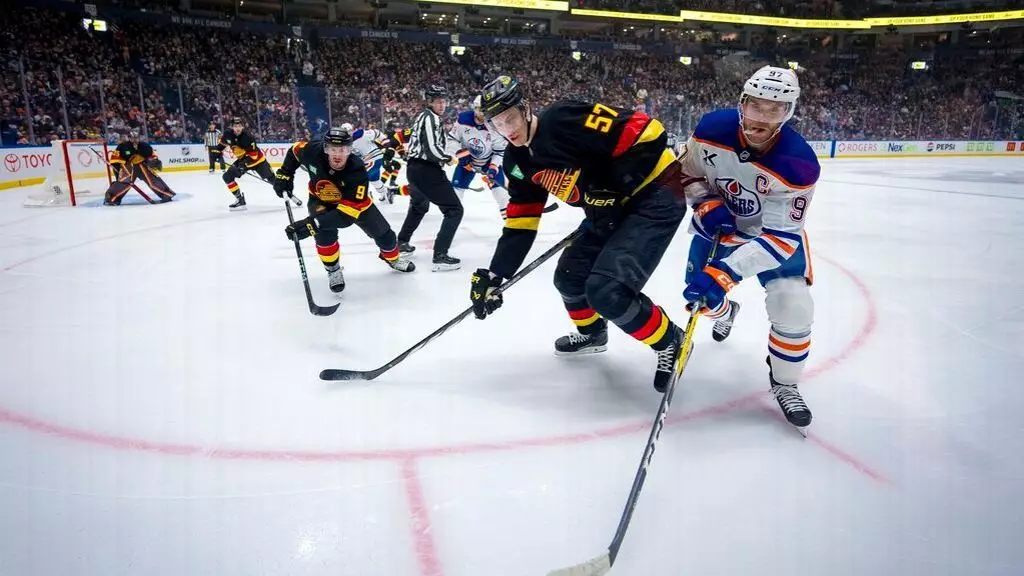In a surprising turn of events during a recent matchup, two prominent NHL players find themselves suspended for their aggressive actions on the ice. Edmonton Oilers’ Connor McDavid, widely regarded as one of the best players in the league, and Vancouver Canucks’ Tyler Myers have each been handed three-game suspensions due to cross-checks targeting opponents’ heads. This incident not only highlights the physicality of the game but raises questions about player conduct, the role of referees, and the NHL’s disciplinary policies.
The Incident: A Scuffle with Consequences
The incident occurred late in a heated game on a Saturday night, where the Oilers were trailing the Canucks 3-2. With less than a minute remaining in the game, tensions escalated, particularly between McDavid and Canucks forward Conor Garland. Following a series of physical exchanges, McDavid retaliated against Garland, delivering a cross-check that connected with the forward’s head. The move was both aggressive and retaliatory, leading to an immediate match penalty for McDavid.
Simultaneously, Tyler Myers was involved in a similar scenario, where he cross-checked Oilers defenseman Evan Bouchard in the head. Following a whistle, the two players engaged in a brief exchange of slashes, with Myers escalating the situation by delivering a forceful cross-check that clearly targeted Bouchard’s head. Both players found themselves in the spotlight as the Department of Player Safety tagged their actions as reckless, leading to three-game suspensions for each.
Connor McDavid, a three-time Hart Trophy winner, has built a reputation not only for his extraordinary skill but also for his relatively clean playing style. Until this point, he had only faced one previous suspension, which speaks volumes about his usual behavior on the ice. However, the emotional stakes of the game seemed to weigh heavily on him during this particular match. Coach Kris Knoblauch commented on McDavid’s frustration that likely contributed to this incident, stating, “He’s under the microscope every time he’s on the ice because he’s so dangerous.”
Although emotional responses are understandable in a competitive setting, the suspension serves as a reminder that even elite players must manage their emotions. The incident has prompted discussions on how high-profile players can influence game dynamics and the importance of leading by example, underlining a bittersweet reality: while excellence on the ice garners admiration, actions driven by frustration can lead to severe repercussions.
The NHL’s Department of Player Safety has faced scrutiny for its disciplinary measures in the aftermath of this incident. Critics argue that suspensions must be consistent and fairly enforced to uphold the integrity of the league and protect player safety. In this case, both McDavid and Myers received equal suspensions despite the different contexts of their actions. The Department reasoned that McDavid’s retaliation was intentional, aimed specifically at Garland’s head, while Myers’ actions were said to be directed similarly but claimed to be less egregious.
Such cases place the league in a precarious position. While the intent behind these actions may vary, the direct consequences of head injuries to players in professional hockey cannot be ignored. The NHL will need to carefully navigate the balance between aggressive gameplay and player safety moving forward, especially as awareness surrounding head injuries continues to grow.
Looking Ahead: The Players’ Response and League Adjustments
Both players will miss crucial games as their respective teams vie for better standings in the league. McDavid, currently fourth in NHL scoring, and Myers, a key defenseman for the Canucks, are expected to make immediate impacts upon their return. Depending on their appeal outcomes, there is the possibility for reconsideration of the suspensions by NHL Commissioner Gary Bettman.
Fans and analysts alike will keep a close watch on whether the league implements adjustments that could potentially alter how disciplinary decisions are made. Beyond evaluating actions on physical terms, there may be a greater emphasis on understanding the emotional and contextual motivations behind player conduct.
The recent suspensions of Connor McDavid and Tyler Myers illuminate the complexities of aggression in the NHL. As the league aims to preserve its competitive nature while prioritizing player safety, it remains crucial to uphold standards of discipline among its elite athletes. As much as the thrill of physicality adds to the allure of hockey, the inevitability of accountability will continue to define its lasting legacy.

